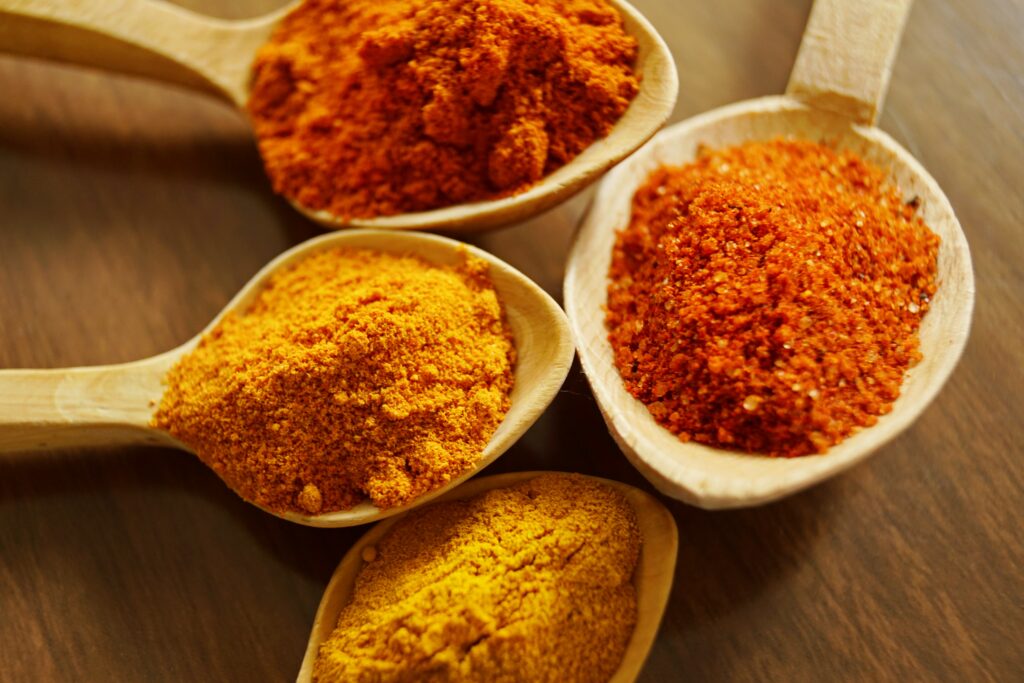
You want to reduce your risk of cancer, and there’s a powerful yellow spice that might just help. Turmeric, known for its vibrant color and distinct flavor, has been studied for its potential anti-cancer properties.
In fact, scientific research suggests that turmeric can fight cancer cells and reduce the risk of developing the disease.
So, if you’re looking for a practical way to incorporate cancer prevention into your daily routine, consider adding turmeric to your diet.
Key Takeaways
- Turmeric’s active compound, curcumin, has anti-inflammatory, antioxidant, and anti-cancer properties.
- Curcumin inhibits the growth and spread of cancer cells by targeting molecular pathways involved in cancer development.
- Turmeric’s anti-inflammatory properties may contribute to its anti-cancer effects.
- More research is needed to fully understand the effects of turmeric on cancer prevention.
Understanding Turmeric’s Anti-Cancer Properties
You should understand turmeric’s anti-cancer properties to protect yourself against cancer. Turmeric, a bright yellow spice commonly found in curry dishes, has gained attention for its potential impact on cancer development.
Research suggests that turmeric contains compounds called curcuminoids, with curcumin being the most active and well-studied compound. Curcumin has been shown to possess anti-inflammatory, antioxidant, and anti-cancer properties.
One way turmeric may help protect against cancer is by inhibiting the growth and spread of cancer cells.
Studies have found that curcumin can interfere with various molecular pathways involved in cancer development, including cell proliferation, apoptosis, and angiogenesis.
By targeting these pathways, curcumin may help prevent the formation of tumors and inhibit their ability to metastasize.
Moreover, turmeric’s anti-inflammatory properties may also contribute to its anti-cancer effects. Chronic inflammation has been linked to the development of various types of cancer.
Curcumin has been shown to suppress inflammation by inhibiting the activity of several enzymes and signaling molecules involved in the inflammatory response.
While research on turmeric’s impact on cancer is still ongoing, incorporating this spice into your diet may be a practical and proactive way to reduce your cancer risk.
Adding turmeric to your cooking or taking curcumin supplements can provide a concentrated dose of this beneficial compound.
However, it’s important to note that curcumin’s absorption is enhanced when consumed with black pepper or fats, so consider combining turmeric with these ingredients for maximum benefit. Stay informed and stay healthy!
Exploring the Link Between Turmeric and Cancer Prevention
To understand the link between turmeric and cancer prevention, it is important to explore the potential benefits of this yellow spice. Turmeric has been used for centuries in traditional Ayurvedic medicine for its medicinal properties.
One of the key components of turmeric is a compound called curcumin, which is known for its anti-inflammatory and antioxidant effects.
Research suggests that curcumin may have cancer-fighting properties, making turmeric an intriguing potential preventive measure against cancer.
Here is a table summarizing the potential benefits of turmeric:
| Potential Benefits of Turmeric |
|---|
| Anti-inflammatory properties |
| Antioxidant effects |
| Anti-cancer properties |
| Immune system support |
It is worth noting that while turmeric shows promise in cancer prevention, more research is needed to fully understand its effects. Currently, there is limited evidence to support the use of turmeric supplements in preventing cancer.
However, incorporating turmeric into your diet as a spice can still provide potential health benefits, including its anti-inflammatory and antioxidant effects.
If you are considering turmeric supplements, it is advisable to consult with a healthcare professional before starting them.
They can provide guidance on the appropriate dosage and potential interactions with any medications you may be taking.
Overall, turmeric’s potential benefits in cancer prevention make it an interesting area of research, but more studies are needed to establish its effectiveness.
You can find out more information in the link attached here: https://rb.gy/h87ex.
Unveiling the Science: How Turmeric Fights Cancer Cells
While there is still much to learn, scientific research has uncovered how turmeric fights cancer cells. Turmeric contains a compound called curcumin, which has been shown to have anti-cancer properties.
Curcumin works by inhibiting the growth of cancer cells and inducing their death, a process known as apoptosis.
It also has the ability to suppress the formation of new blood vessels that tumors need to grow and spread, a process called angiogenesis.
Additionally, curcumin has been found to reduce inflammation, which is a known factor in the development and progression of cancer.
Turmeric’s impact on other health conditions is also being studied. Research suggests that curcumin may have potential for treating other diseases such as arthritis, Alzheimer’s disease, and heart disease.
It has antioxidant properties that can help protect cells from damage caused by free radicals, which are highly reactive molecules that can lead to chronic diseases.
The future of turmeric research looks promising.
Scientists are continuing to investigate the mechanisms by which curcumin exerts its anti-cancer effects and are exploring ways to enhance its bioavailability, as curcumin is poorly absorbed by the body.
Clinical trials are also underway to determine the optimal dosages and combinations of curcumin with other drugs or therapies to improve its effectiveness against cancer.
Incorporating Turmeric Into Your Cancer Prevention Regimen

Regularly incorporating turmeric into your cancer prevention regimen can provide you with its protective benefits. There are various ways to include this yellow spice in your daily routine.
One option is to incorporate turmeric into your meals by using it in recipes. For example, you can add a teaspoon of turmeric powder to your soups, stews, or stir-fries to enhance the flavor and reap the potential health benefits.
Turmeric can also be used as a spice rub for meats or sprinkled on roasted vegetables for an added kick.
Another option is to consider turmeric supplements. These supplements contain concentrated amounts of curcumin, the active compound in turmeric, which has been shown to have anti-cancer properties.
When choosing a turmeric supplement, look for one that contains black pepper or piperine, as this can enhance the absorption of curcumin by the body.
It’s important to consult with your healthcare provider before starting any new supplements to ensure they are safe and appropriate for you. Incorporating turmeric into your cancer prevention regimen doesn’t have to be complicated.
By adding it to your meals or considering turmeric supplements, you can potentially harness the protective power of this yellow spice in your fight against cancer.
To read and understand more about this, https://rb.gy/ju63k.
Harnessing the Potential: Turmeric’s Role in Reducing Cancer Risk
If you want to reduce your risk of cancer, harness the potential of turmeric by incorporating it into your diet.
Turmeric, a yellow spice commonly used in Asian cuisine, has been found to have potential benefits in reducing the risk of various types of cancer.
Research has shown that turmeric contains a compound called curcumin, which has been found to possess anti-inflammatory, antioxidant, and anticancer properties.
Numerous studies have investigated the effects of turmeric supplementation on cancer prevention.
One study found that curcumin inhibited the growth of cancer cells and induced apoptosis, or programmed cell death, in various types of cancer, including breast, lung, and colon cancer.
Another study showed that curcumin reduced the growth and spread of prostate cancer cells.
In addition to its direct effects on cancer cells, turmeric has also been found to modulate various signaling pathways involved in cancer development and progression.
For example, curcumin has been shown to inhibit the activation of nuclear factor kappa B (NF-κB), a transcription factor that plays a crucial role in inflammation and cancer.
By inhibiting NF-κB, curcumin can help suppress the inflammatory response and potentially prevent the development of cancer.
Incorporating turmeric into your diet is easy and can be done in various ways. You can add turmeric powder to your meals, such as curries, stir-fries, or soups.
You can also enjoy turmeric tea or golden milk, which is a warm beverage made with turmeric, milk, and other spices. Alternatively, you can consider turmeric supplements, which are available in capsule or liquid form.
It’s important to note that while turmeric shows promise in reducing cancer risk, it should not be considered a standalone treatment or prevention method.
It is best to incorporate turmeric into a balanced diet that includes a variety of fruits, vegetables, whole grains, and lean proteins.
Additionally, it’s always a good idea to consult with a healthcare professional before starting any new supplementation regimen.
Frequently Asked Questions
Can turmeric alone cure cancer?
No, turmeric should not be used as a sole treatment for cancer. While it has shown promise in research, it is not a substitute for conventional cancer therapies like chemotherapy and radiation. It can, however, be considered a potential complementary approach to cancer treatment under the guidance of healthcare professionals.
Are there any side effects associated with turmeric consumption?
Turmeric is generally safe when used in moderate amounts in cooking. However, excessive consumption or high-dose supplements may lead to digestive issues or interact with certain medications. It’s essential to use turmeric responsibly and consult a healthcare professional if you have concerns.
Can turmeric be used for cancer prevention in individuals with no family history of the disease?
Yes, turmeric’s potential cancer-fighting properties are not limited to those with a family history of cancer. It can be part of a healthy diet and lifestyle for anyone interested in reducing their risk of developing cancer.
What other health benefits does turmeric offer beside cancer prevention?
Turmeric is known for its anti-inflammatory and antioxidant properties. It may help with conditions like arthritis, heart health, and digestive issues. It’s a versatile spice with a range of potential health benefits.
Can I include turmeric in my daily diet even if I’m not concerned about cancer?
Yes. Turmeric can be a flavorful and healthy addition to your daily diet, offering a wide range of potential health benefits beyond cancer prevention. It’s a versatile spice that can enhance various dishes.
Conclusion
Incorporating turmeric into your daily routine could be a game-changer in reducing your cancer risk. The science behind turmeric’s anti-cancer properties is promising, showing how it fights cancer cells and offers protection.
By adding this yellow spice to your diet, you can take a proactive step toward safeguarding your health. Don’t miss out on this powerful tool for preventing cancer.
Start incorporating turmeric into your meals today and experience the potential benefits it may bring.

